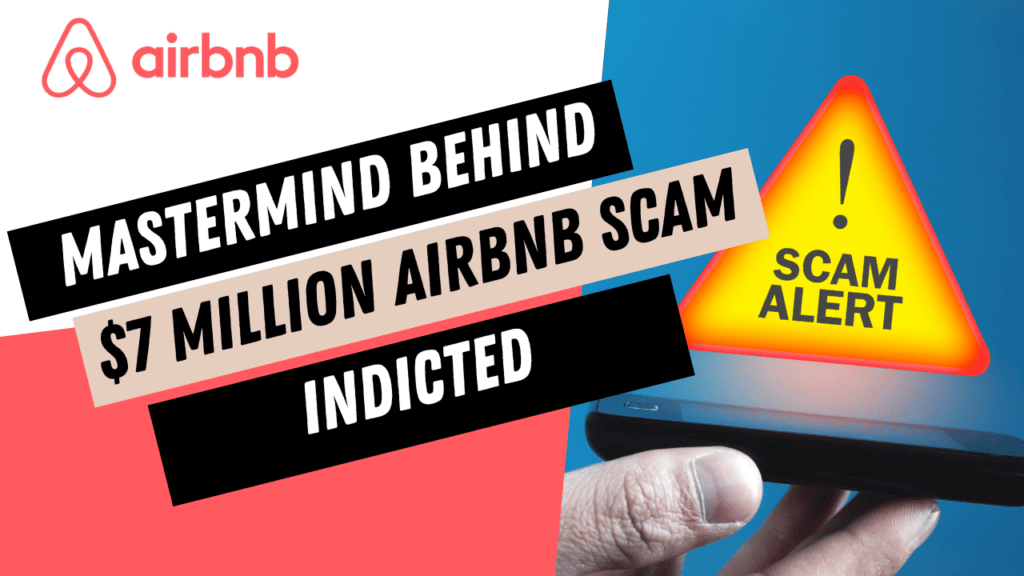The recent uncovering of a vast Airbnb scam involving nearly 100 properties across the United States and generating over $7 million from Airbnb bookings, along with additional profits from platforms like Vrbo, has put the short-term rental industry under scrutiny. Facing serious charges including Wire Fraud and Aggravated Identity Theft, the central figure in this scam, Shray Goel, between January 2018 and November 2019, orchestrated a complex operation that deceived countless guests and sullied the reputation of honest rental businesses. Our team at RentalScale-Up has delved into the court documents to provide our readers with a concise yet comprehensive overview of how this extensive scam operated, its mechanisms, and its impact on the industry
Overview of the Scam
The Initial Discovery by Allie Conti
The scam first came to light through an investigative article by Allie Conti, who personally experienced and then uncovered a nationwide fraud on Airbnb. Her discovery revealed a pattern of deceptive practices, including fake listings, emergency situations used as bait-and-switch tactics, and guests being relocated to subpar accommodations.
The Modus Operandi
In-Depth Analysis of the Scam’s Operation
The scam orchestrated by Shray Goel and his associates was a complex, multi-layered operation designed to exploit the trust of Airbnb users for financial gain. Here’s a detailed breakdown of how this intricate scheme functioned:
Creation of Fake Airbnb Profiles and Listings
- Elaborate Fabrication: The scammers created numerous fake Airbnb profiles. These profiles didn’t represent real individuals but were carefully constructed personas.
- Appealing Listings: The listings attached to these fake profiles were made to be highly appealing to potential guests. They often showcased properties in desirable locations with attractive features and amenities.
- Manipulated Reviews: To enhance the credibility of these listings, the scammers fabricated reviews. These reviews, ostensibly from past guests, painted a picture of delightful stays, responsive hosts, and excellent property conditions. In reality, they were entirely fictitious, designed to lower the guard of prospective guests.
Fabricated Emergencies and Accommodation Switching
- Last-Minute Changes: Guests who booked these properties would, at the last moment, be informed of an unforeseen issue — typically a plumbing problem or damage from a previous guest — rendering the property unavailable.
- Alternative Accommodations: The guests were then offered alternative accommodations. However, these alternatives were significantly inferior in terms of quality, location, and amenities compared to what was originally booked and paid for.
Double-Booking and Profit Maximization
- Secret Overbooking: A pivotal element of this scam was the practice of double-booking. The same property would be listed multiple times under different profiles and booked to different guests for the same dates.
- Selective Guest Retention: When the dates approached, the scammers would assess which booking was more profitable. They would retain the higher-paying guest while deceiving the others with the aforementioned fabricated emergencies.
- Refusal of Refunds: In many cases, when guests objected or requested refunds due to the switch to substandard accommodations, they were either outright denied or faced significant resistance. This tactic not only maximized profits but also reduced the likelihood of guests pursuing further action given the complexity and stress involved in such disputes.
Impact on Guests and the Industry
- Compromised Guest Experience: Many guests, often in unfamiliar cities or without alternative accommodation options, found themselves in challenging and uncomfortable situations. This led to ruined vacations, business trips, and a general distrust in the Airbnb platform.
- Reputation Damage: For legitimate Airbnb hosts and vacation rental managers, this scam cast a shadow over the industry. It raised questions about the reliability and safety of booking through platforms like Airbnb, potentially driving away future guests.
Prejudice and Extent of the Scam
Scale and Financial Impact
The scale of this fraudulent operation was vast, involving nearly 100 properties across the United States. Financially, the scam was lucrative, generating over $7 million from Airbnb bookings alone, with additional profits from other platforms like Vrbo.
Legal Proceedings and Industry Implications
Charges and Legal Consequences
Shray Goel faces serious charges, including Wire Fraud and Aggravated Identity Theft. If convicted, the legal consequences are severe, including the forfeiture of properties and financial assets obtained through the scam.
Implications for Airbnb
This incident has highlighted significant gaps in Airbnb’s verification and oversight mechanisms. However, it’s crucial to acknowledge the strides that Airbnb has made since then to fortify its platform security and vetting processes, largely spearheaded by its designated ‘party pooper,’ Naba Banerjee. Recognizing the imperative to protect both guests and the integrity of the rental marketplace, Airbnb implemented a series of robust measures, such as the deployment of AI-powered algorithms to screen and flag high-risk reservations, comprehensive identity verification procedures for both guests and hosts, as well as removing listings that fail to meet its stringent criteria.
Implications for Other Rental Platforms and The Industry At Large
While the incident is often referred to as an ‘Airbnb scam’, it’s important to highlight that the fraudulent activities extended beyond Airbnb. According to prosecutors, the duo also operated on Vrbo, where they reportedly made $1.5 million before being banned in 2015.
This broader context underscores the fact that the challenges of ensuring safety and verification are not exclusive to one platform or company. Instead, these issues pervade the entire short-term rental marketplace, impacting all key stakeholders, from hosts and managers to rental platforms themselves.
For the industry, this incident serves as a wake-up call, highlighting the need for more stringent safety and verification standards. It underscores the pressing need to protect both guests and the integrity of the rental marketplace from such fraudulent practices. However, this is not a task that can be undertaken independently by each platform.
There is an increasing recognition that collaboration and cooperation among key stakeholders, including major booking platforms, are essential in tackling these issues effectively. A noteworthy development in this regard is the recent formation of the Coalition of Trusted Reviews. This coalition sees industry giants such as Booking.com and Expedia collaborating with other major players across various sectors to present a unified front against fraudulent practices.
By working together, these platforms can share insights, pool resources, and develop shared standards, thereby strengthening their collective ability to detect and prevent fraud.
Conclusion
The revelation of this scam is a wake-up call for the short-term rental industry. It underlines the importance of vigilance and the need for improved safety measures. For hosts and vacation rental managers, this incident serves as a reminder of the critical role they play in maintaining trust and integrity in the industry. Strengthening verification processes and advocating for regulatory oversight are essential steps in ensuring such scams do not tarnish the reputation of legitimate rental businesses.








